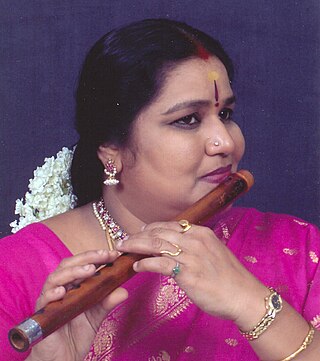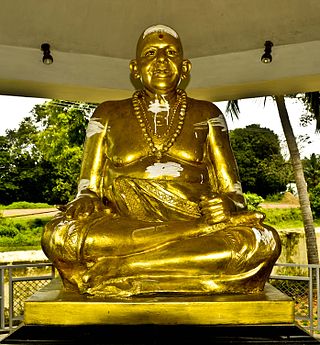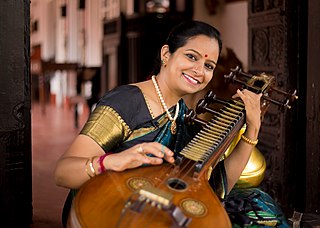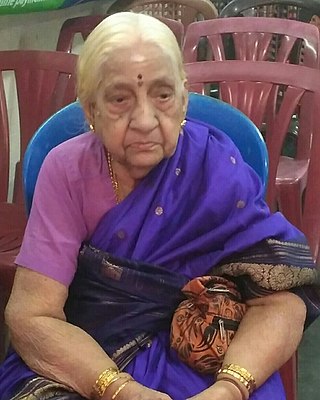Rugmini Gopalakrishnan | |
|---|---|
 Smt. Rugmini Gopalakrishnan playing the Saraswati veena | |
| Born | 1936 Tamil Nadu, India |
| Occupation | Veena artist |
Rugmini Gopalakrishnan (born 1936) is a Saraswati veena artist in Carnatic music from India.
Rugmini Gopalakrishnan | |
|---|---|
 Smt. Rugmini Gopalakrishnan playing the Saraswati veena | |
| Born | 1936 Tamil Nadu, India |
| Occupation | Veena artist |
Rugmini Gopalakrishnan (born 1936) is a Saraswati veena artist in Carnatic music from India.
Smt. Rugmini Gopalakrishnan was born in Tamil Nadu, before moving to Kerala with her family as a young girl. She is the granddaughter of Gayakashikhamani Harikesanallur Muthiah Bhagavatar. She has spent over 65 years teaching, recording and performing of Carnatic music in India [1] and is one of the best Veena teachers in India.[ citation needed ]
She began her preliminary training in music and vocal under her uncle, Sri Nellai T.V. Krishnamoorthy, prior to receiving the Government of India Cultural Scholarship to undertake deeper studies in Carnatic music on the Saraswati veena with Padma Bhushan K. S. Narayanaswamy. In 1954, at the age of 17, Rugmini won the President's Award from the first President of India, Rajendra Prasad, at the first All India Radio (AIR) Competition for Veena [2] at 18 years of age. She served as Professor and Head of the Department of Music in the Swathi Thirunal College of Music in Thiruvananthapuram, Kerala from 1957 to 1986. She went on to serve as Principal at Chembai Memorial Government Music College in Palakkad from 1987 to 1990. [2]
She is a member of the Board of Studies at University of Calicut and a Member of the Audition Board of All India Radio for Delhi and Thiruvananthapuram, and the author of several Indian government commissioned books and essays on Carnatic music in the Tamil and Malayalam languages. She has been given the title A-Top Grade Artist with All India Radio, a station that has been broadcasting her Veena recitals for over 64 years starting 1954. She gives performances regularly on the national Indian television channel Doordarshan. [1]

Madurai Thirumalai Nambi Seshagopalan is a noted Carnatic singer, musician and composer. He was awarded the Madras Music Academy's Sangeetha Kalanidhi in 2006. As well as being a master of the veena and harmonium, he is an exponent of harikatha.

Semmangudi Radhakrishna Srinivasa Iyer was an Indian Carnatic vocalist. He was the youngest recipient of the Sangeetha Kalanidhi awarded by the Music Academy in 1947, a distinction he holds to this day as of 2023, probably the only musician to receive that honour before reaching 40. He had received many other awards as well, including Padma Bhushan and Padma Vibhushan from the Government of India, Rajyasevanirata title from Travancore's erstwhile ruling family, Sangeet Natak Academy award (1953), Isai Perarignar from Government of Tamil Nadu and Kalidas Samman from Government of Madhya Pradesh. He was affectionately addressed as "Semmangudi Maama" by his disciples. He was also considered the "Pitamaha" or the grand sire of modern Carnatic Music. He was conferred with an honorary doctorate by University of Kerala in 1979.
Harikesanallur Muthiah Bhagavatar, commonly known as Muthiah Bhagavatar, is one of Carnatic classical music's famous twentieth-century composers. He also created about 20 ragas.

Lalgudi Gopala Jayaraman was an Indian Carnatic violinist, vocalist and composer. He is commonly grouped with M.S. Gopalakrishnan and T.N.Krishnan as part of the violin-trinity of Carnatic Music. He was awarded Padma Bhushan by the Government of India in 2001.

Sikkil Mala Chandrasekhar is a noted South Indian carnatic flautist. Mala Chandrasekhar was born to a musical family.

Chembai Vaidyanatha Bhagavatar a.k.a. Vaidyanatha Iyer was a Carnatic music singer from Palakkad. Known by his village name Chembai, or simply as Bhagavatar, he was born to Anantha Bhagavatar and Parvati Ammal in 1896, into a Tamil Brahmin family in Perakkool Madom, adjacent to Lokanarkavu near Vatakara on Janmashtami day. He lived here until he was five years old. The family later shifted to Palakkad. Chembai was noted for his powerful voice and majestic style of singing. His first public performance was in 1904, when he was nine. A recipient of several titles and honours, he was known for his encouragement of upcoming musicians and ability to spot new talent. He was responsible for popularising compositions like Rakshamam Saranagatam and Pavana Guru, among others. The music critic 'Aeolus' described him as "the musician who has meant the most to Carnatic Music in the first fifty years of the 20th century." His prominent disciples include Chembai Narayana Bhagavathar, Mangu Thampuran, Guruvayur Ponnammal, T. V. Gopalakrishnan, V. V. Subramaniam, P. Leela, K. G. Jayan, K. G. Vijayan, K. J. Yesudas, Kudumaru Venkataraman and Babu Parameswaran, among others. He also mentored many young accompanists, including Palghat Mani Iyer, Lalgudi Jayaraman, M. S. Gopalakrishnan, T. N. Krishnan, Palani Subramaniam Pillai and L. Subramaniam. Memorial music festivals have been held in his honour annually since his death in 1974, the most important being the annually celebrated Chembai Sangeetholsavam.

The Sarasvatī vīṇa is an ancient Indian plucked veena. It is named after the Hindu goddess Saraswati, who is usually depicted holding or playing the instrument. Also known as raghunatha veena, it is used mostly in Carnatic Indian classical music. There are several variations of the veena, which in its South Indian form is a member of the lute family. One who plays the veena is referred to as a vainika.

Harikatha, also known as Harikatha Kaalakshepam in Telugu and Tamil, is a form of Hindu traditional discourse in which the storyteller explores a traditional theme, usually the life of a saint or a story from an Indian epic. The person telling the story through songs, music and narration is called a Haridasa.

Jayanthi Kumaresh is an Indian Veena musician. Jayanthi comes from a lineage of musicians who have been practising Carnatic music for six generations and started playing the Saraswati Veena at the age of 3. Her mother, Lalgudi Rajalakshmi, was her first teacher and she later underwent intense training from her maternal aunt, Padmavathy Ananthagopalan. She was also taught by S. Balachander and went on to perform with him as well. She is married to Kumaresh Rajagopalan, the younger of the violinist duo Ganesh–Kumaresh. She is the niece of violinist Lalgudi Jayaraman.
Paapanaasam Raamayya Sivan was an Indian composer of Carnatic music and a singer. He was awarded the Madras Music Academy's Sangeetha Kalanidhi in 1971. He was also a film score composer in Kannada cinema as well as Tamil cinema in the 1930s and 1940s.

"Bombay" Jayashri Ramnath is an Indian Carnatic vocalist, singer, and musician. She has sung in multiple languages including Tamil, Telugu, Kannada, Malayalam and Hindi movies. Born into a family of musicians, Jayashri represents the fourth generation of music practitioners in her family. Trained by Lalgudi Jayaraman and T.R. Balamani, she was awarded India's fourth highest civilian award, the Padma Shri, in 2021. She has become one of the most sought after Carnatic musicians today.

Nirmala Rajasekar is a Carnatic Saraswati veena player, composer, vocalist, and educator. One of the world's premier veena players, Rajasekar has performed at Carnegie Hall, the United Nations, the Madras Music Academy, Narada Gana Sabha, Sawai Gandharva Festival, and the Konya International Mystic Music Festival. Rajasekar is the current co-chair of the American Composers Forum.
K. S. Narayanaswamy, was a Carnatic veena exponent of the Thanjavur style, in which nuances and subtleties are given more importance over rhythm based acrobatics. He was awarded the Madras Music Academy's Sangeetha Kalanidhi in 1979.
Krishna Kumar is an Indian actor and politician from Kerala who appears in Malayalam and Tamil films and television. He is also a former News Reader in Doordarshan and All India Radio. He is now a BJP national council member from Kerala.
Mannargudi Sambasiva Bhagavathar (1912–2004) was a Carnatic musician, musicologist, Harikatha exponent and composer.

Leela Omchery is a classical singer, musicologist and writer. She is known for her contributions to classical music and is a recipient of Padmashri award from Government of India for her contributions to Indian classical dance and music.

Dr. Gayatri Sankaran is an Indian Carnatic musician and vocalist specialising in Carnatic vocals and violin performances. She is a recipient of the Kalaimamani award from Tamil Nadu Eyal Isai Nataka Manram, a unit of the Directorate of Art and Culture, Government of Tamil Nadu. The Government of India honoured her in 2006 with the award of Padma Shri, the fourth highest Indian civilian award for his contributions to music, making her the first visually impaired woman to receive the award.

Smt. Pushpa Srivatsan is an ardent worshipper of Sadguru Sri Tyagabrahmam of Tiruvaiyaru, Tamil Nadu. She is a Sarasvati Veena artiste. Pushpa picked up the rudiments of the Veena Dhanammal technique from Sri R. Rangaramanuja Ayyangar, a great admirer of Veena Dhanammal and her disciple for 12 years. Reclusive by nature, Pushpa does not give public performances. For her music is worship. Her veena music and singing are entirely for her Sadguru. She has written prolifically on the Sadguru in chaste Sanskrit. She has also projected onto the Sadguru her ecstatic experiences in the Himalayas, the Ganga and the majestic sea – again in Sanskrit prose and poetry. All her writings contain her own English and Tamil translations.

Parassala B. Ponnammal was an Indian Carnatic musician from the south Indian state of Kerala. She was a classical carnatic vocalist in the lineage of Semmangudi Srinivasa Iyer, Muthiah Bhagavathar, and Papanasam Sivan. She was the first woman to perform at the Navaratri Mandapam in Thiruvananthapuram as a part of the Navaratri Celebrations of the Sri Padmanabhaswamy temple in Kerala.
K. S. Gopalakrishnan is an Indian carnatic flute player.